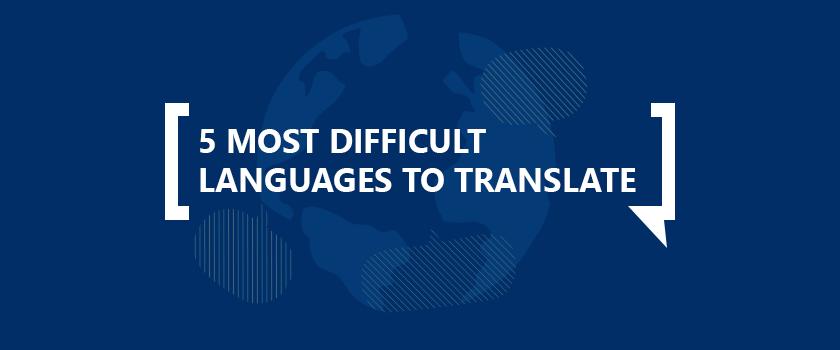There are around 7097 languages spoken around the world. One cannot speak all these languages. To interact with a diverse world, it is important to talk to people in their native language. This has resulted in the need for translation. Companies preparing to go global require the translation of documents because the head office needs to coordinate with their subsidiaries and to keep consistency and standardization in the company. People think that translation is an easy task because it is just a conversation of words from one language to another. But in reality, it is a tedious job. They are unaware of the fact that direct word to word correlation is not possible in languages, so the translator needs to be very careful in selecting the words while doing the translation. There are many things that human translators can do which cannot be done by machines. So to get the translation of the most difficult languages, you need to hire a reliable translation company that can provide you with impeccable translation services.
The translation of closely related languages is more difficult when there is no equivalent of words and phrases present in the target language. Before translation, the context of the phrase and word needs to be understood. The translation is also a difficult task because of the cultural diversity. Languages are shaped as per cultural nuances and their dialect depicts their region. We can say that translation is culturally specific. Some emotions and concepts cannot find their equivalent words in other languages so the translators should be aware of cultural intricacies. They require linguistic proficiency, knowhow of cultural nuances, and linguistic competency in both languages. Another difficulty in translation is of polysemy. Polysemy deals with many meanings for a single word. This causes hurdles in translation because the direct translation cannot give an accurate equivalent.
Languages and their Translation
Translation of languages is required in every field because the world has become a global village.
If you want to migrate or want to go for higher studies, translation is required. The translation is a source of communication from one language to another, so for precise and accurate translation, professional translators are required. Translators come across a variety of difficult languages. Languages that are from the same group of the family are easy to translate. While languages from different groups of families are difficult to translate due to core differences. The languages that are tough to translate are mostly from Asia, such as Mandarin Chinese, Japanese, and Thai. Let’s have a look at the 5 most difficult languages to translate.
Mandarin Chinese
The Mandarin language is a difficult language to translate because it comprises 80,000 characters with unique sounds and pronunciation. It is a tonal language and any change in the pitch and tone will change the meaning of the words. Many words have more than one meaning. The use of idioms, homophones, and dictums makes the Chinese language very difficult to translate. The translators that need to translate Chinese documents should have interpretative and creative skills so that they can translate Chinese documents accurately without ignoring the purpose of the document. Before translating the Chinese language, the translators should know the context of the document.
Arabic
Just like Mandarin Chinese, Arabic also has a large vocabulary followed by numerous dialects. The Arabic language is difficult to translate because of its wide range of vocabulary and many words have multiple meanings. Moreover, the writing style makes it more complex. Arabic is written from right to left. Different dialects of the Arabic language affect the quality of translation. The translators that need to translate Arabic documents should be very careful in the selection of words, because a single concept can be described in different ways that can affect the context of the Arabic documents. Written Arabic is also very tough because letters are written differently due to their position in words and vowels are never written.
Korean
Korean is an isolated language that shows it has no genealogical relationship to other languages. It is rarely spoken outside of Korea. Syntax in the Korean language is different from the English language that makes it difficult to translate. Pronunciation and grammar rules also make it difficult to translate. Only native translators can provide an impeccable and accurate translation.
Japanese
Japanese is a heavily-nuanced language and it has thousands of characters. The sentence structure and grammar rules followed in the Japanese language are different from western languages. It is a difficult language to translate because there are three writing systems used in the Japanese language. Kanji is the writing style based on Chinese characters and it is very complex and traditional so the translation of Japanese documents requires more effort than other translation tasks. To make their task easy, the Japanese translators need to break the sentence formation into small chunks so that they can provide their audience with seamless and culturally nuanced translation.
Thai
Thai is the language that is not influenced by Western languages. The Thai language is written in Khmer script and it is not associated with other language families. Just like the Chinese language, Thai is also a tonal language that conveys different messages through their tones. Thai is the most difficult language to translate because it has a large number of alphabets, 44 consonants, and 18 vowels. There is no upper and lower case used in Thai letters and sentences do not end up at the full stop. No spaces are used in sentences either. For the translation of Thai documents, the translator needs to know the context of the sentence, adverbs, and tenses that are used instead of verbs. In the Thai language, it is very difficult to classify adjectives and adverbs. Furthermore, there is no gender and plural form used in the Thai language. The professional translator should know about all the complexities of the Thai language so that they can make their translation task easy and provide their customers with state-of-the-art translation services.
Wrapping Up
Whether you need professional document translation or website translation into any of these languages, CCJK has got you covered!
We have a team of native translators that are subject matter experts. They are proficient translators who know the linguistic and cultural intricacies. Knowing the level of difficulty in the translation project, we assign the project to those translators that are experienced and have a knowledge of these difficult languages. So if you want to get precise and accurate translation services at fast turnaround time and economical rates, contact us.









